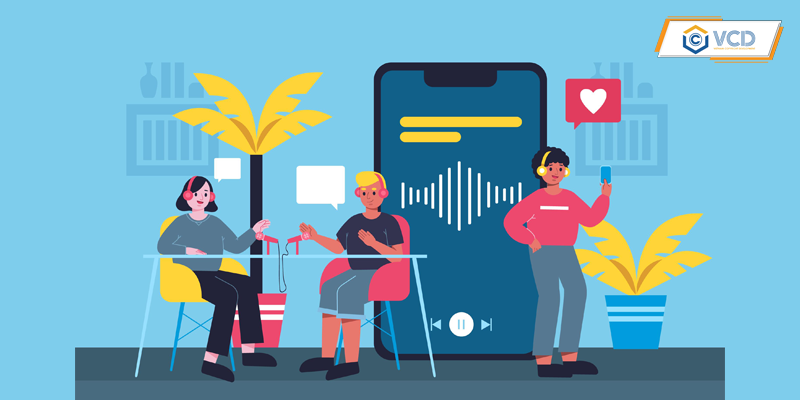Is livestreaming singing other people’s music considered copyright infringement?
Livestreaming singing famous songs on social networks is becoming a popular trend. However, many people accidentally fall into the legal “trap” of using copyrighted music without permission from the author. So, is livestreaming singing other people’s music considered copyright infringement? In the article below, VCD will help you understand the legal regulations on music copyright in the online environment.
- What is livestreaming? Current trend of livestreaming singing
“Livestreaming” is a form of live video broadcasting on social networking platforms such as Facebook, TikTok, YouTube, Instagram… allowing users to communicate, share and interact with audiences in real time. With just a phone with a camera and an Internet connection, anyone can become a “live broadcaster”, attracting hundreds, even thousands of viewers at the same time.
Since social media platforms have promoted the livestream feature, this form has quickly become a familiar connection and entertainment tool. And live singing, especially cover singing or online karaoke, has become a real “fever”. On Facebook or TikTok, it is not difficult to come across live singing sessions, where the livestreamer holds the microphone and interacts with viewers through the comment section. A few familiar songs, a little genuine emotion and the ability to connect naturally… are enough to attract tens of thousands of views and shares.
Not just a passion, live singing also opens up real opportunities to make money. Many people have turned their singing hobby into a significant source of income through donations, virtual gifts, advertising contracts, or combined with online sales. A fun live singing session can both entertain, build a personal image, and bring economic benefits.
However, behind those moments of sublimation lies a potential legal risk that not everyone realizes: music copyright infringement. Because most of the songs used in livestreams – from pop music, lyrical music to international music, are works that are protected by copyright.
This means that if you sing or play someone else’s music in a livestream without permission, that action can be considered copyright infringement, whether you are just “singing for fun” or “not charging money”. Many streamers, freelance singers or social media users have accidentally gotten into trouble because they do not understand music copyright regulations, an issue that is increasingly being tightened in today’s digital environment.

2. Is livestreaming singing someone else’s music considered copyright infringement?
According to Article 6 and Article 20 of the Intellectual Property Law 2022, copyright arises automatically from the moment a work is created and expressed in a certain material form, without registration. For musical works, copyright includes: Personal rights: Name, title, protect the integrity of the work; property rights: Permission to copy, perform, communicate the work to the public, distribute, import, etc.
Thus, when you livestream singing someone else’s song, you are performing and communicating the work to the public. This is the property right of the copyright owner and if not permitted, that act can be considered a violation of copyright.
However, not all cases of singing someone else’s music are violations. Livestreaming will be considered a copyright infringement if all of the following factors are met:
- The song is still under copyright protection (usually for the lifetime of the author and 50 years after their death).
- The livestreamer does not ask for permission or pay royalties to the author, musician, or copyright owner.
- The livestream is public and shared widely on the network platform, not just within the family.
- The livestream has commercial elements, for example: receiving donations, advertising products, selling goods, or making money from the platform.
If you satisfy the above conditions, you may be considered to have used the musical work without permission, leading to a violation of the author’s property rights according to the law. They may be handled according to Decree 131/2013/ND-CP with the following fines:
- From 15 to 35 million VND for performing or transmitting the work without permission.
- Forced to remove infringing content, publicly apologize and compensate for damages to the copyright owner.
- In case of a major commercial violation, causing serious damage, the perpetrator may also be prosecuted under Article 225 of the 2015 Penal Code.
Therefore, if you want to livestream singing someone else’s music, you need to:
- Ask for permission or buy the copyright to use the song from the author, musician, or the Vietnam Center for Music Copyright Protection (VCPMC).
- Or you should only choose songs that have expired protection, public music or copyright-free music.
The above is an article on “Is livestreaming singing someone else’s music considered a copyright violation?” that VCD wants to share with you. Hopefully you have a better understanding of the regulations on music copyright and what to pay attention to when livestreaming.
Sincerely,
Even if you don’t charge money or have no commercial purpose, the law still considers this an act of public use of a work. Therefore, if the song is still under protection and you don’t ask for permission, you can still be administratively fined or asked to remove the infringing content. The fine can be up to 35 million VND according to Decree 131/2013/ND-CP.
This also depends on the copyright and related rights holder. In fact, not all singers are the copyright owners of the song, this right can belong to the composer, producer, or recording company. Therefore, even if the singer agrees, you should still contact the official copyright owner to ask for permission or sign a legal use agreement before livestreaming.
